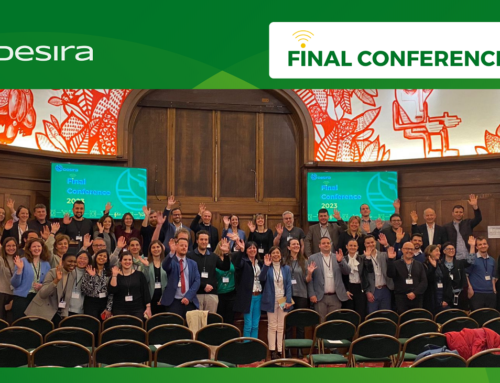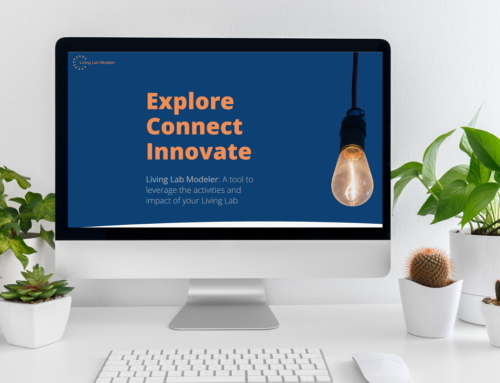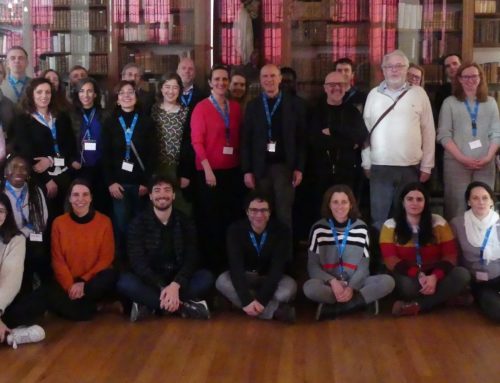Author: Lucia Garrido (AEIDL)
On 26 January 2022, as part of the General Assembly, DESIRA organised a round table on ‘The importance of policies for the digitalisation of Rural Areas’. The policy session was moderated by Enrique Nieto, Head of the Policy Unit at AEIDL, and structured around two main sessions: the first one focused on policies for rural digitalisation, while the second one discussed the role of Agricultural Knowledge and Innovation Systems (AKIS) and data economy in the digital transformation. Watch the recording of the full session below:
Policies for rural digitalisation
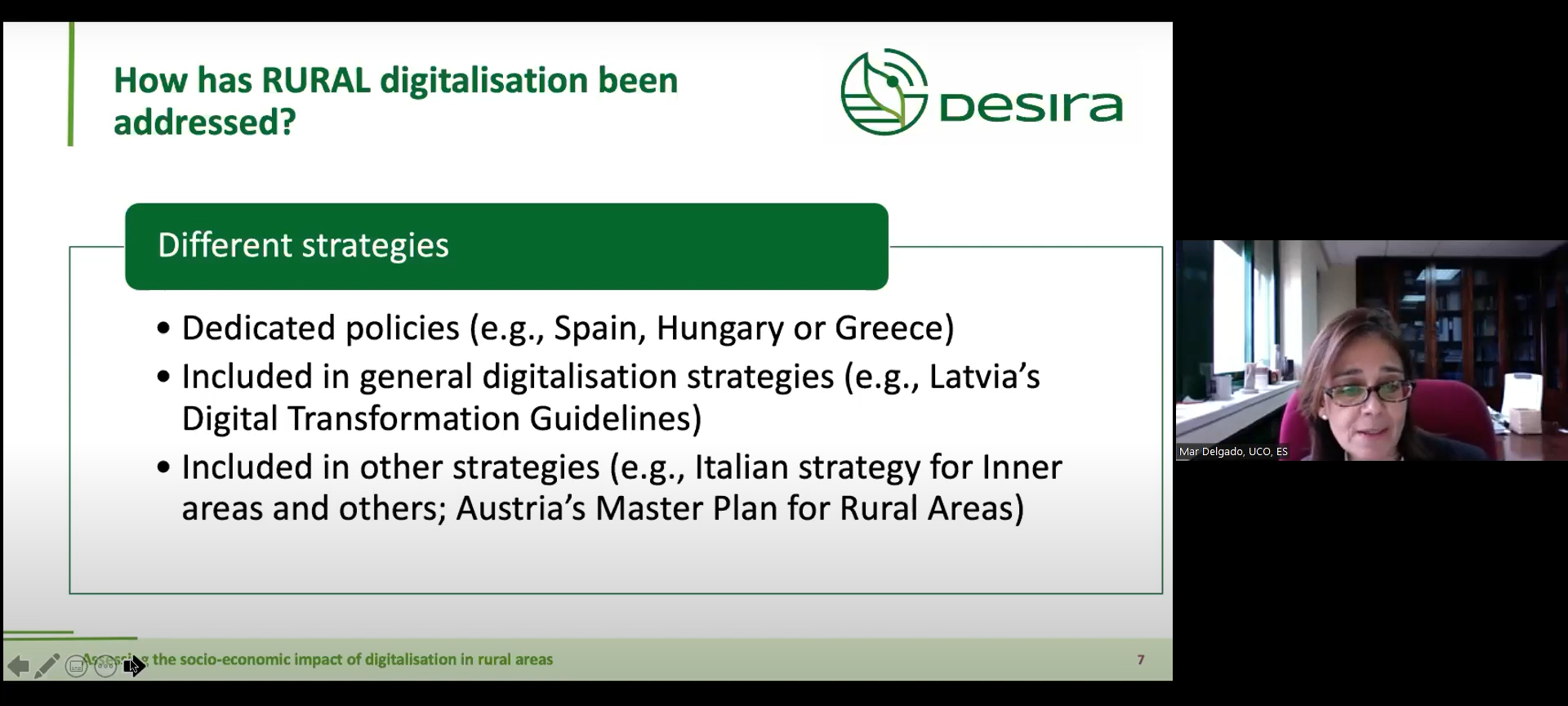 Mar Delgado, from the University of Córdoba and coordinator of the DESIRA work package on policy, opened the webinar. DESIRA has performed policy analysis in the 15 countries of the consortium, examining national and regional policies affecting digitalisation in rural areas with a two-fold approach: how digitalisation policies impact rural areas, and how rural development policies address digitalisation.
Mar Delgado, from the University of Córdoba and coordinator of the DESIRA work package on policy, opened the webinar. DESIRA has performed policy analysis in the 15 countries of the consortium, examining national and regional policies affecting digitalisation in rural areas with a two-fold approach: how digitalisation policies impact rural areas, and how rural development policies address digitalisation.
The analysis performed by DESIRA covers the national context for digitalisation, in terms of access to broadband and connectivity, differences between urban and rural areas, and the digital divide; European Digital Policies and how they influence rural digitalisation; national, regional or even local policies boosting digitalisation, and private strategies. Countries have followed very different strategies and approaches towards digitalisation, which might be due to the fact that this is a complex issue, dealing with different dimensions, different starting points, and different readiness levels. Cross-country analysis is difficult to perform, given the lack of data availability. Preliminary results show that most countries have started by addressing connectivity first, while usage and adoption of technologies have come second, however, these two dimensions should go in parallel. Finally, Ms Delgado pointed out how this is a good moment to align rural digital strategies with European and national ones, as well as to coordinate national digital strategies. See the presentation from Mar Delgado.
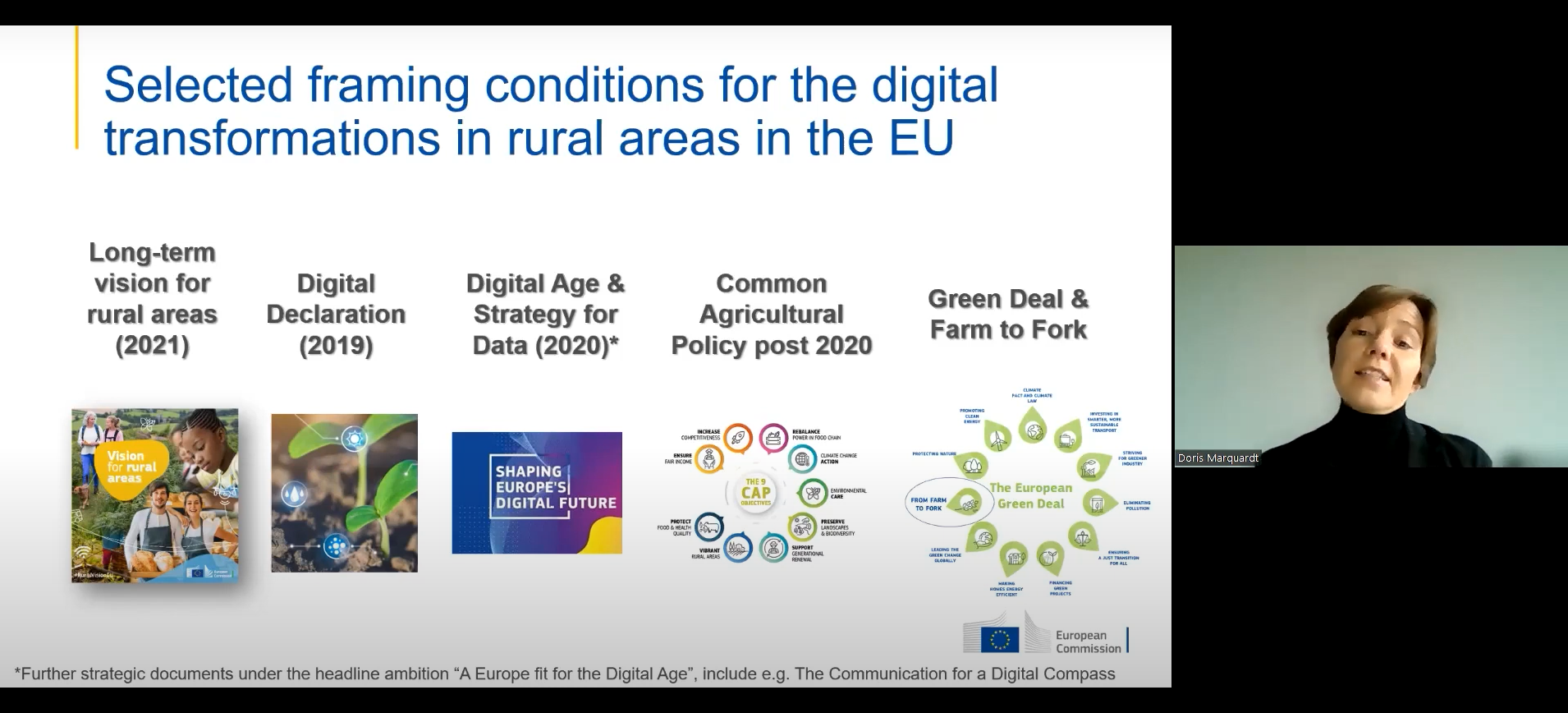 Doris Marquardt, from the Directorate-General for Agriculture and Rural Development (DG AGRI) of the European Commission, presented different EU digitalisation policies for rural areas. She presented framing conditions for the digital transformation in EU rural areas, such as the long-term vision for rural areas, the Digital Age & Strategy for Data, the Common Agricultural Policy post-2020, and the Green Deal and Farm to Fork strategies. Strengthening broadband connectivity is needed, but so are other enablers, such as supporting the development of digital skills, providing advisory services, facilitating investments, promoting targeted R&I at local or regional level, or providing data and facilitating data sharing.
Doris Marquardt, from the Directorate-General for Agriculture and Rural Development (DG AGRI) of the European Commission, presented different EU digitalisation policies for rural areas. She presented framing conditions for the digital transformation in EU rural areas, such as the long-term vision for rural areas, the Digital Age & Strategy for Data, the Common Agricultural Policy post-2020, and the Green Deal and Farm to Fork strategies. Strengthening broadband connectivity is needed, but so are other enablers, such as supporting the development of digital skills, providing advisory services, facilitating investments, promoting targeted R&I at local or regional level, or providing data and facilitating data sharing.
Regarding the digitalisation strategies in the National CAP Strategic Plans, there are important challenges in gathering data when it comes to cross-country comparison. Digitalisation in agriculture tends to be more elaborated than digitalisation in rural areas. References to DESIRA can be found on these National CAP Strategic Plans.
There are other policy instruments that support digitalisation, such as Horizon Europe, or the Recovery & Resilience Facility. The Digital Europe Programme, launched in November 2021, proposes measures to boost digitalisation in agriculture, forestry and rural areas. For example, it proposes Common European Data Spaces for Agriculture, and for Smart Communities, support to Digital Innovation Hubs (DIHs) and a network of DIHs, or support to advanced digital skills. See the presentation from Doris Marquardt.
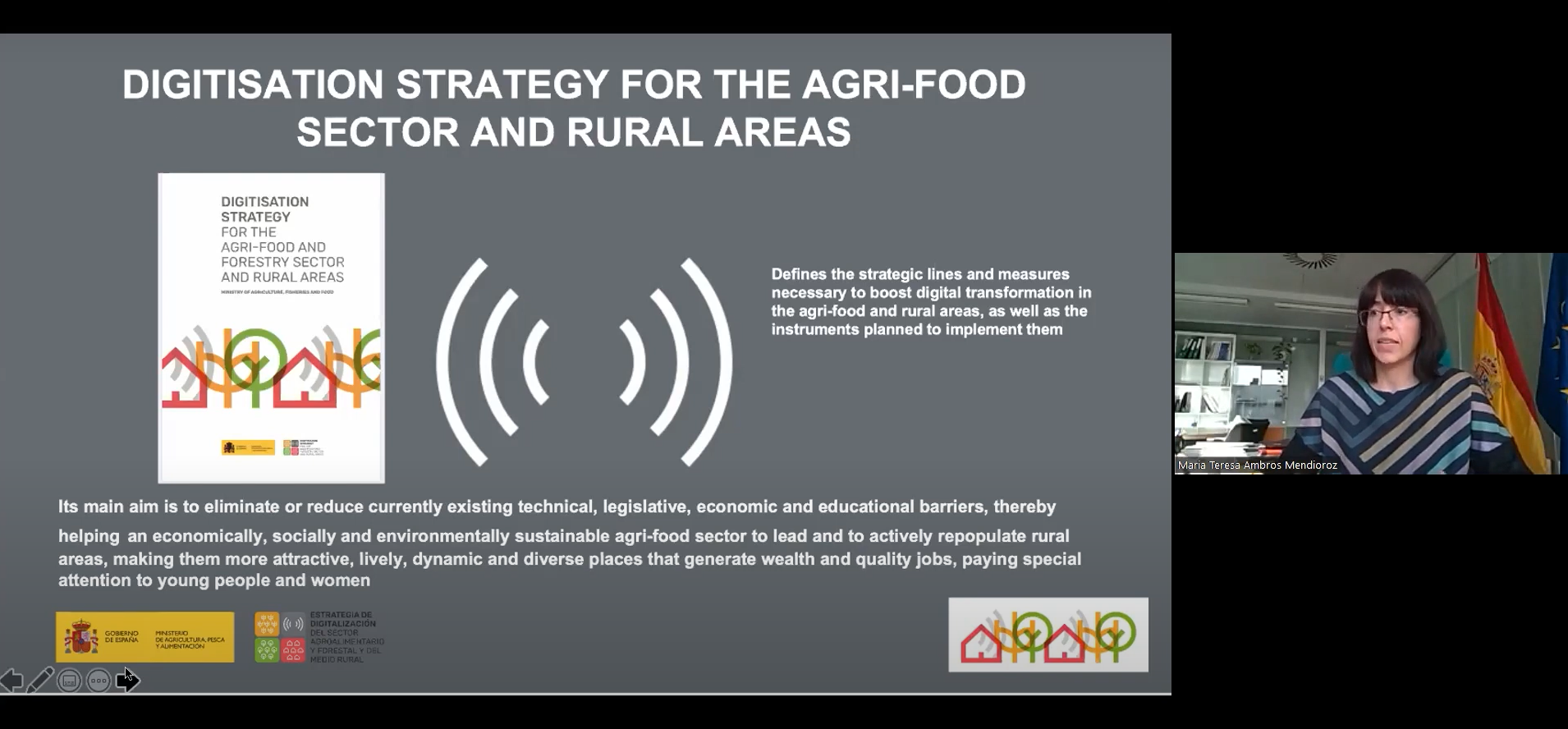 Coming from the Spanish Ministry of Agriculture, María Teresa Ambrós presented the Spanish Digitisation Strategy for the agri-food sector and rural areas, which was launched in 2019. This Strategy has three main objectives:
Coming from the Spanish Ministry of Agriculture, María Teresa Ambrós presented the Spanish Digitisation Strategy for the agri-food sector and rural areas, which was launched in 2019. This Strategy has three main objectives:
- To narrow the digital gap, both in terms of connectivity and digital skills.
- To foster data use, as an engine to boost the sector, by addressing interoperability of the sector’s data and opening data storage.
- To boost business development and new business models in rural areas, promoting the agro-industry 4.0 and opportunities for diversification and proving advice for the adoption of Agricultural Knowledge and Innovation Systems (AKIS).
This strategy is being developed in two action plans, the first one running from 2019 to 2020, and the second one, funded by the Recovery, Transformation and Resilience Funds, will run from 2021 to 2023. This II Action Plan focuses on four main actions:
- Specific line of support for technology-based entrepreneurship in the agri-food sector;
- Digital Innovation Hub (DIH)
- Advisory platform of the AKIS
- Digitalisation Observatory of the agri-food sector.
See the presentation from María Teresa Ambrós.
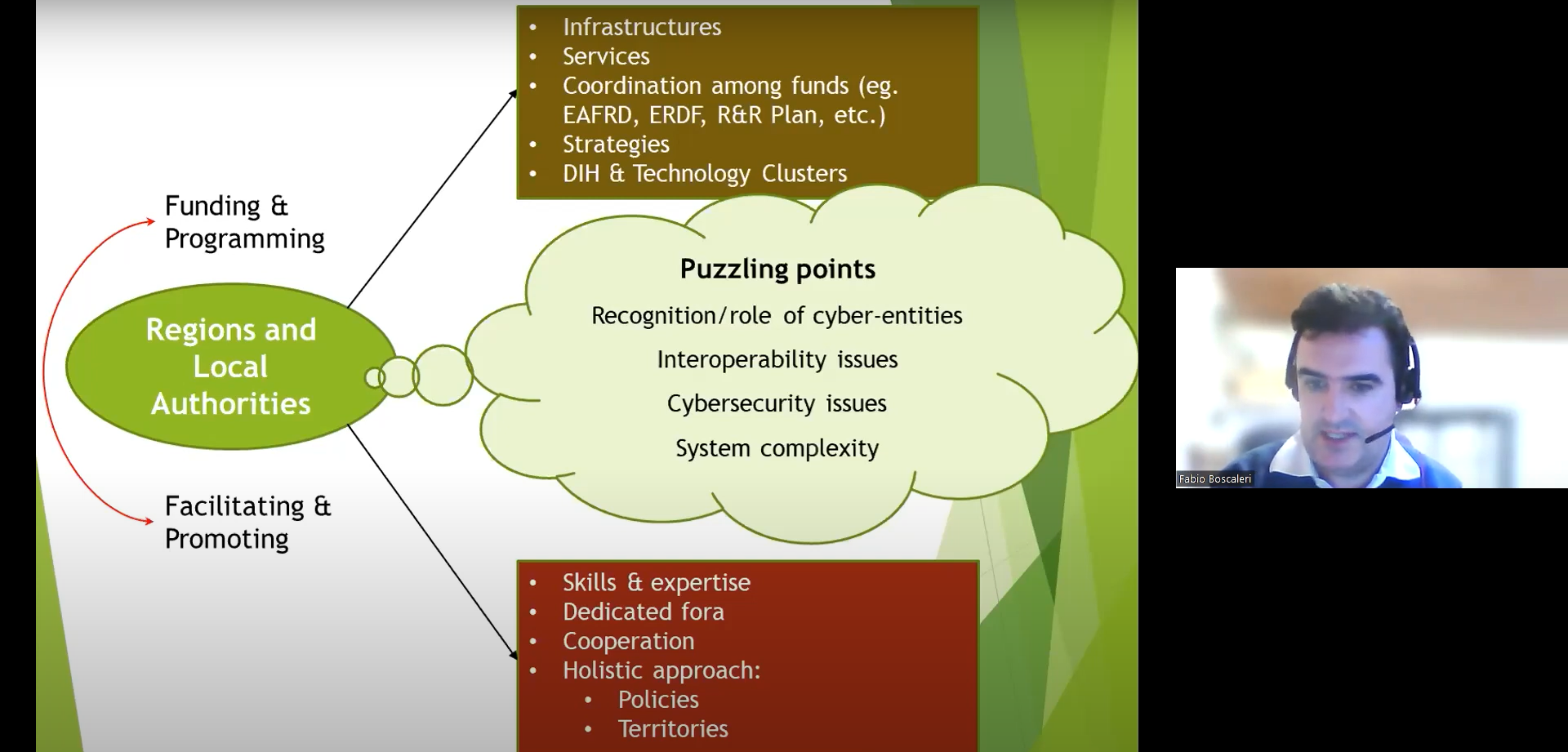 Fabio Boscaleri, from the Regional Government of Tuscany, presented the role that regions have in the digitalisation of rural areas. Mr Boscaleri highlighted that regions and local authorities have two main roles: funding and programming, and facilitating and supporting. Within the first profile, regions can provide infrastructures, local services, coordination among funds (such as the EAFRD, ERDF, R&R Plan…), digitalisation strategies and, finally, DIHs and Technology Clusters. Within the second role of facilitating and promoting, regions support the development of skills and expertise, open dedicated fora, promote cooperation at regional, national and European levels, and have a holistic approach about policies and territories.
Fabio Boscaleri, from the Regional Government of Tuscany, presented the role that regions have in the digitalisation of rural areas. Mr Boscaleri highlighted that regions and local authorities have two main roles: funding and programming, and facilitating and supporting. Within the first profile, regions can provide infrastructures, local services, coordination among funds (such as the EAFRD, ERDF, R&R Plan…), digitalisation strategies and, finally, DIHs and Technology Clusters. Within the second role of facilitating and promoting, regions support the development of skills and expertise, open dedicated fora, promote cooperation at regional, national and European levels, and have a holistic approach about policies and territories.
Mr Boscaleri also pointed out some puzzling points that regions face when dealing with digitalisation, i.e. the recognition of cyber entities, interoperability issues, cybersecurity issues, or the system complexity. See the presentation from Fabio Boscaleri.
Digital transformation: AKIS and data economy
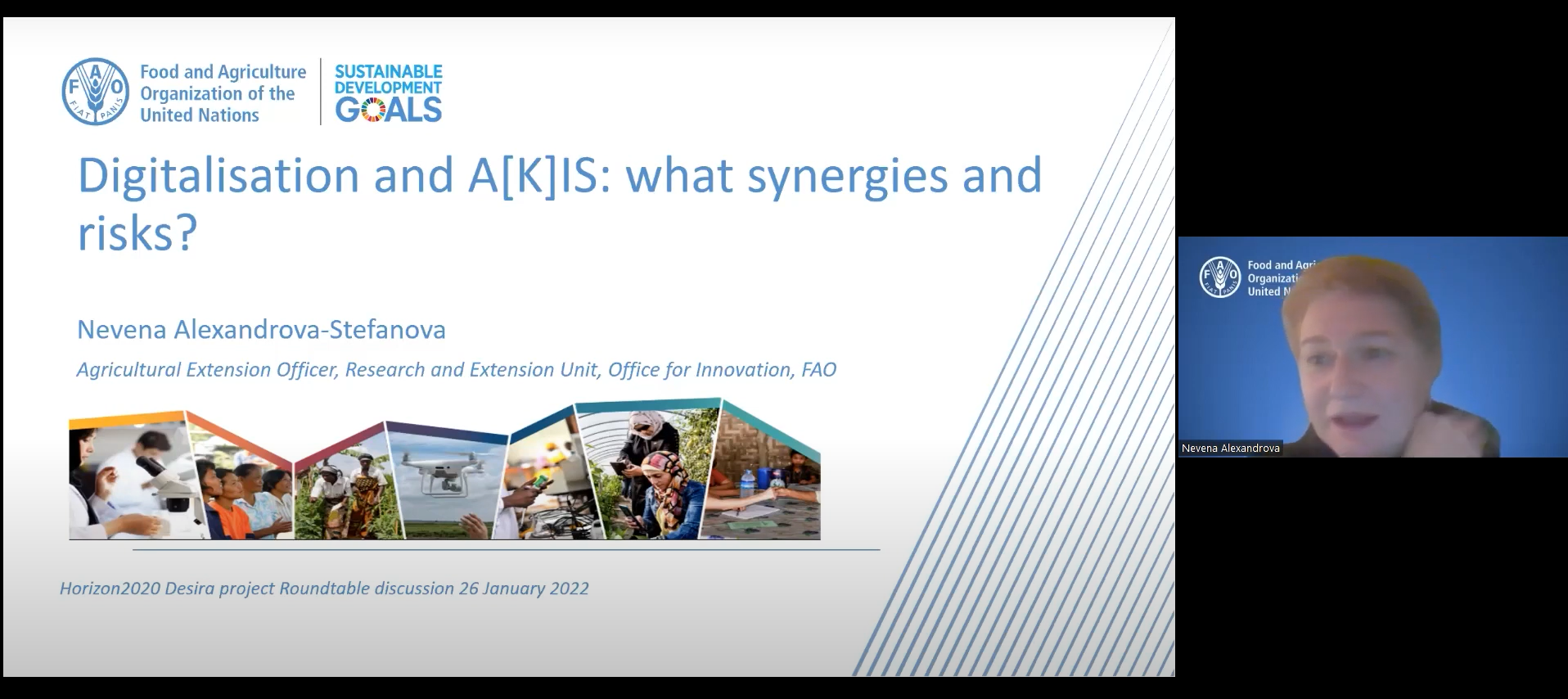 Nevena Alexandrova, from the FAO, presented the synergies and risks of digitalisation and Agriculture Innovation Systems (AIS). She started by introducing the “quadruple squeeze”, pressures globally faced in terms of demographics, ecosystems and biodiversity, climate pressure, and surprise events.
Nevena Alexandrova, from the FAO, presented the synergies and risks of digitalisation and Agriculture Innovation Systems (AIS). She started by introducing the “quadruple squeeze”, pressures globally faced in terms of demographics, ecosystems and biodiversity, climate pressure, and surprise events.
In order to achieve the Sustainable Development Goals (SDGs), there is a strong need for the rapid transformation of food systems, in which digitalisation and AIS play a cross-cutting role. It is smallholders and family farms that will determine the transformation pace. Digitalisation brings opportunities for smallholders and family farming, but it also brings challenges:
- technological challenges, as big data complexity, unclear data ownership, lack of connectivity and capacities, or lack of adequate technologies for these actors;
- environmental challenges, such as increased use of energy or increased CO2 emissions; and
- socio-economic challenges, such as the quadruple divide (digital, rural-urban, gender, rich-poor), impact on employment, or lack of support systems.
A recent FAO analysis shows that the main factors of success to minimise risks and maximise benefits are the following:
- availability of a critical mass of digital knowledge and innovation skills
- combined solutions lead to better results
- bigger and coordinated AIS lead to a greater impact
- entrepreneurship and partnerships play a key role.
Ms Alexandrova concluded by highlighting that, although capacities, policies, investment and infrastructure are key, there is also a need for policy interventions to ensure inclusivity, and the transition towards evidence-based policy and multi-actor approaches.
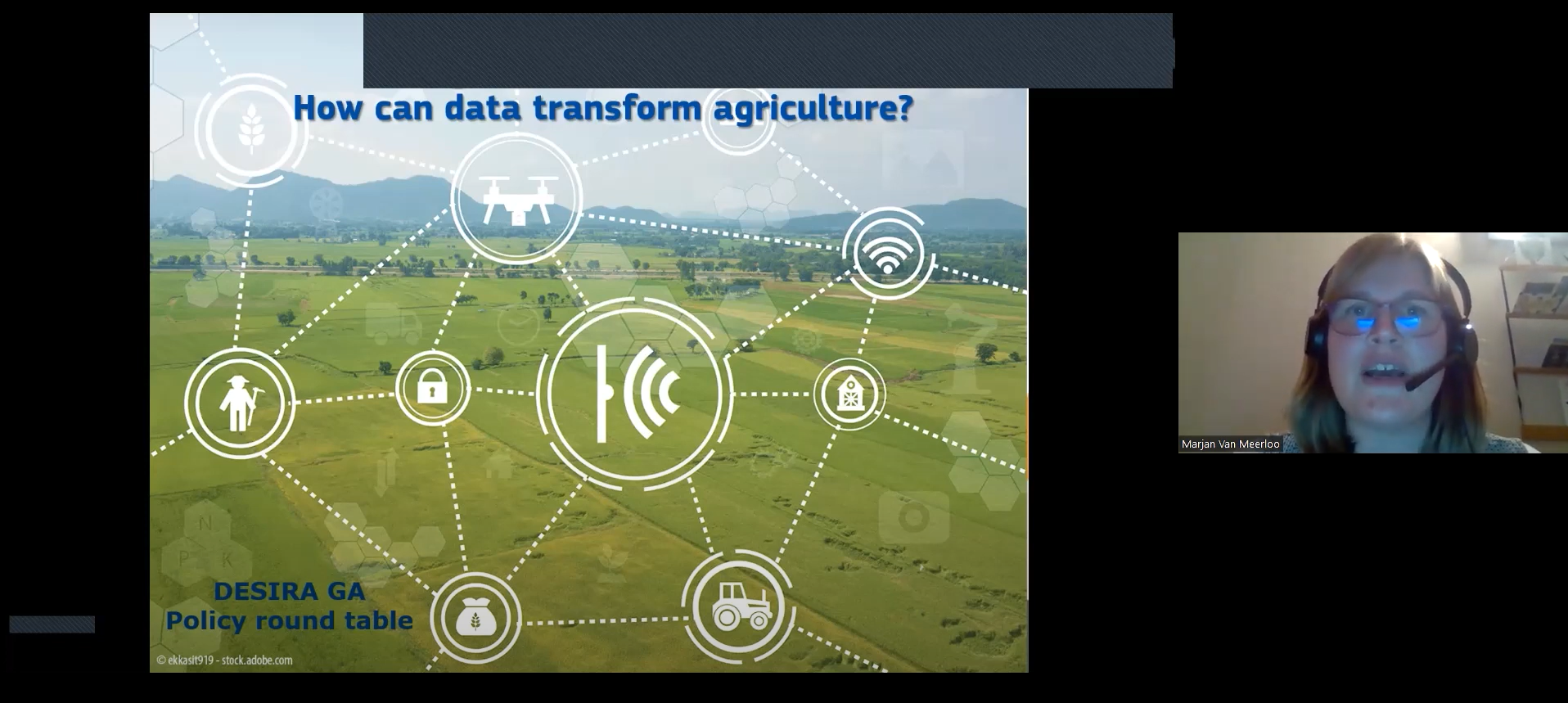 The last to intervene was Marjan Van Meerloo, from the DG for Research and Innovation (DG RTD) of the European Commission. Ms Van Meerloo presented the European Partnership of Agriculture of Data. Using the possibilities offered by data technologies in the field of Environmental Observation (EO), the Partnership aims at providing support to improve the sustainability performance of agriculture, and improving the capacities for policy monitoring and evaluation.
The last to intervene was Marjan Van Meerloo, from the DG for Research and Innovation (DG RTD) of the European Commission. Ms Van Meerloo presented the European Partnership of Agriculture of Data. Using the possibilities offered by data technologies in the field of Environmental Observation (EO), the Partnership aims at providing support to improve the sustainability performance of agriculture, and improving the capacities for policy monitoring and evaluation.
The expected EU value that the Partnership will bring is the following:
- Umbrella effect, consolidating efforts on different places, levels, uses cases and pilot projects.
- Contributing to the defragmentation of Environmental Observation and agricultural data landscapes.
- Achieving systematic effects and creating sustainable structures for the provisions of data-based solutions.
- Achieving a critical mass in creating big data and geospatial reference data sets.
- Covering several biogeographic zones to allow for the development of climate adaptation approached for the sector
- Covering whole Europe to create data sets for policy monitoring and evaluation.
See the presentation from Marjan Van Merloo.
Ginaluca Brunori, coordinator of DESIRA, closed the webinar. He mentioned that we are living an acceleration and intensification of initiatives about digitalisation in rural areas. However, coordination is missing: we need to think about monitoring mechanisms to understand what is happening. The DESI report, for example, is insufficient to comprehend digital transformation of rural areas. At the same time, orchestration is needed: we need to be connected to each other to be able to steer the process towards the SDGs.


